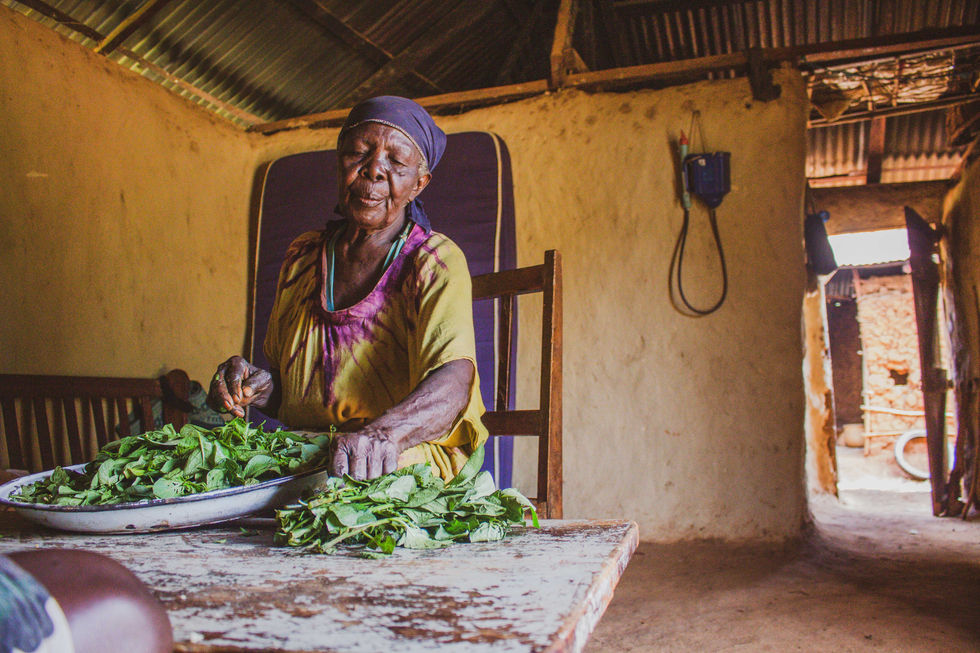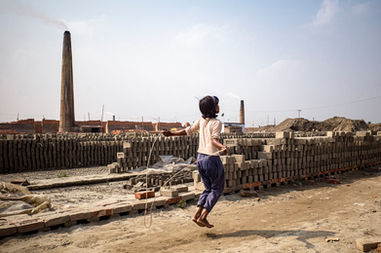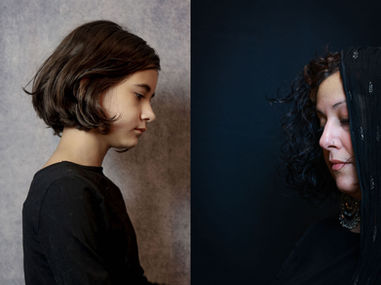
PICTORIAL STORY
August 6, 2021
ZAINAB THE SUPER FARMER
Photography and story by Anwar Sadat
Introduction by Karin Svadlenak-Gomez
Kenyan photographer Anwar Sadat is passionate about documenting the hard working people in his neighbourhood and in his country. Often he makes and effort to visit particular projects and highlights the accomplishments of initiatives to improve people's lives. For this story, he visited the farmer Zainab, who participated in a project by the One Acre Fund and had won several awards for her efforts. Anwar tells the story of super farmer Zainab, who was able to improve her standard of living quite a lot because of the farming education programmes she participated in. We salute Zainab and all hard-working people like her!
-min.jpg)
Earlier in 2020 between August and September and this year 2021 in May, I visited Zainab Onjwang to do a story on her and about One Acre Fund, a nonprofit organization that supplies smallholder farmers in East Africa with asset-based financing and agriculture training services to reduce hunger and poverty. Zainab is 78 years old and has been a member of One Acre Fund for 10 years. The fund has been providing her maize seeds, vegetables, tree seedling and fertilizer at a fee that she pays back over a period of six months.
Throughout the farming cycle, all the farmers registered as members of the One Acre Fund receive training and support on cultivation, planting, pruning, harvesting, proper storage, and economic aspects. Nine years ago, Zainab was awarded the certificate of a "super farmer" and a "fully trained and certified farmer".
Zainab is the mother of eight grown-up sons and daughters and a grandmother to no fewer than 20 grandchildren. She has never stepped into a classroom, hence she cannot read or write. She can, however, speak three languages (two vernacular and one national language). She has been taught the English alphabet, numbers and simple calculations by her grandchildren, whom she has been living with since her husband died in 1994.
When her husband died, Zainab's life became hard and complicated. Some of her children were still under her care. Living in a village, there are not many jobs to be had aside from farming. Most of the land is cultivated, and if they are not very well organized, some families tend to suffer from hunger before the harvesting season. Zainab admitted to having experienced some hardships after the loss of her husband. But in 2010, she learned about the One Acre Fund, an organizations that helps farmers grow their way out of hunger and build a lasting pathway to prosperity.
They trained her in a language she could understand. Without writing or reading skills, she was able to memorise all that she could manage. After some time she graduated as a trained farmer with a certificate. At a fee that every farmer registered under this fund must pay within a period of 6 months, she can get help and professional guidance during her planting, pruning and harvesting seasons, and also advice on proper storage. In accordance with the regulations and guidelines of the fund, she was always required to store half of her harvest for at least six months and make use of the remainder for consumption or to make money from it, if possible.
Maize production was the main focus because "ugali" a product of maize flour is the staple food in Kenya. As she had been promised when joining One Acre Fund, her produce output increased, and her standard of living increased from the level of mere survival. She became able to harvest enough maize to last her for a full year, for her own consumption and for sale, making money out of it without struggling.
At her age, she has taken up a series of other projects that she has been running successfully. This includes tree planting and fish farming. Her main purpose for joining the tree planting project is to help and maintain the ecosystem. The funders of the project give advice on trees to plant and proper ways of caring for them. These trees are later used for making charcoal or sold to people who might be interested in firewood produced without environmental degradation.
One project that Zainab is very proud of and actively involved in is fish farming. When it was first introduced, it proved difficult and expensive. Zainab took a free training course, again depending on her power to memorise and practice what she was taught to qualify as a fish farmer. The project was demanding and not many people could keep up. After digging the ponds and introducing the first fishlings farmers were responsible for the maintenance of their own fish ponds and for feeding the fish for a period of at least 6 months before the fish could be harvested. Food fed to the fish could be bought from shops, but considering that not many villagers can afford to buy it, farmers were taught how to make their own food for the fish, a process that proved very difficult and demanding for many farmers. As a result, after the first harvest of the fish most of them abandoned their ponds and only three farmers, including Zainab, stuck with it.
Although it is recommended to harvest the fish every 6 months, Zainab would prefer to harvest her fish only once a year when the fish are fully mature. During harvesting, she could harvest upto 400 large fish and 200 relatively smaller fish that she sold on the market. Primarily, in as much as she makes a profit in her maize farming project, this fish farming project is where she makes most of her money because even after fishing, she could never remove all the fish from her pond, even if she wanted to. They keep on reproducing, and her biggest task is to keep her pond clean and feed the fish until maturity.

If optimism were to be defined as a person, then she would best fit the description. Despite all her setbacks, troubles, and illiteracy, Zainab never gave up. She believes that education is good. As a matter of fact, at her age, she loves the idea of reading very much. She always wishes that she had had an opportunity to go to school when she was young. Maybe she could have done more for herself and her family. Nevertheless, she is a proud mother and grandmother who is helping her daughters take care of her grandchildren.

The views, thoughts, and opinions expressed in the text belong solely to the author, and are not necessarily shared by The Pictorial List and the team.




































